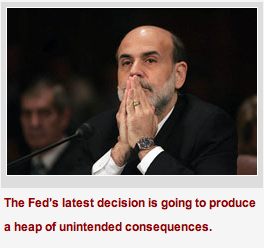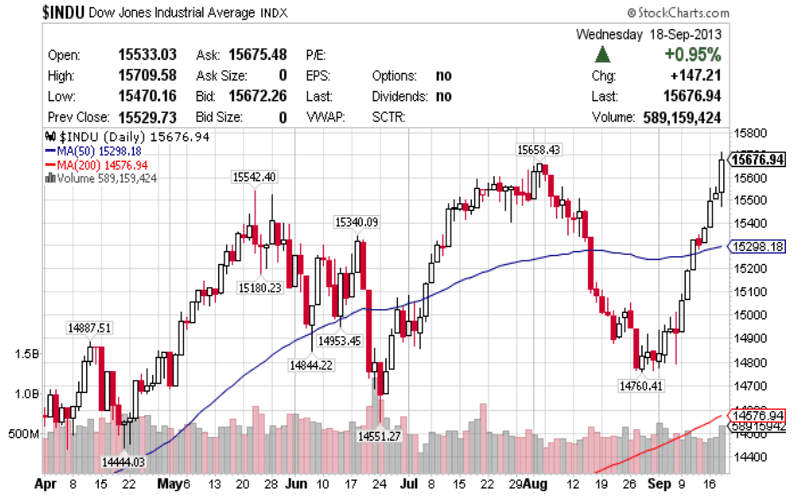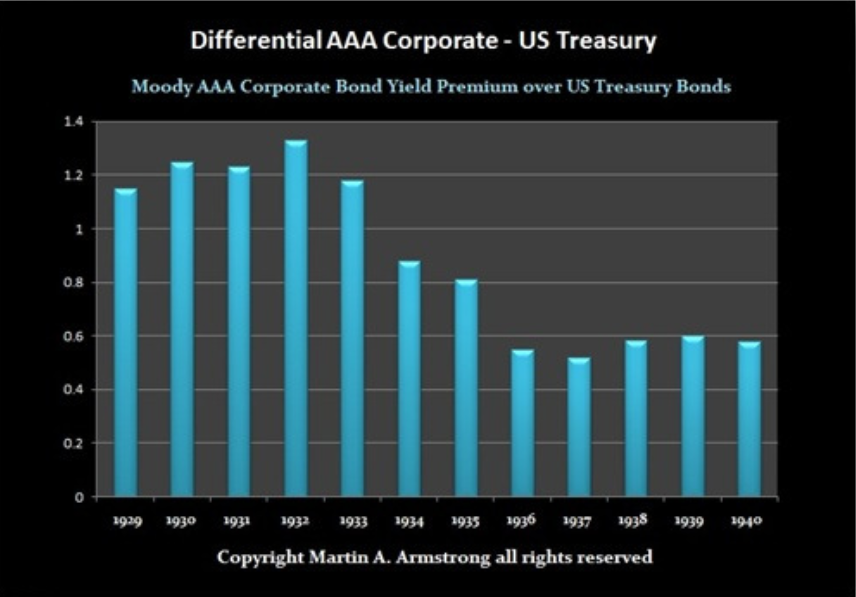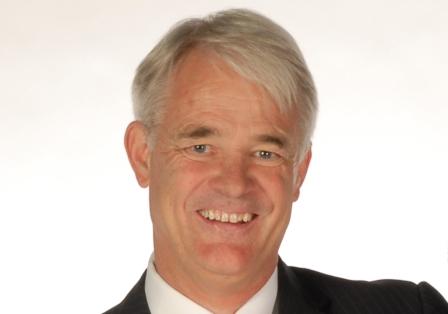Bonds & Interest Rates
Dear Mr. Bernanke,
Never mind all those foolish critics out there who said otherwise. They can criticize you all they want, but had they been in your shoes back then, they would have implemented the very same measures and policies you did. I’m sure of it.I hope this letter works its way into your inbox. After all, I used to be one of your staunchest supporters. You’ve been unfairly treated in the past. When the global financial system melted down in 2008-09, you took the right measures.
You had no choice but to pump trillions of dollars into the global economy. If you hadn’t, the world would have gone back to the dark ages.
But with your latest decision, I think you blew it big time. Here’s why:
First, you believe the U.S. economy is not yet strong enough to stand on its own two feet. But do you really think the money-printing-addicted U.S. economy is going to get better with still more opiates?
Is that the right medicine at this time? After all, if the U.S. economy is going to turn the corner, it’s going to do it with or without you.
And if it’s not going to turn the corner at this point, then all your hard work and all the money that you continue to print isn’t going to amount to a hill of beans.
 Second, you’re worried that Washington may soon run out of money. The debt-ceiling battle is about to ramp up again with a vengeance. There’s even a real chance the government will run out of funds and have to shut down.
Second, you’re worried that Washington may soon run out of money. The debt-ceiling battle is about to ramp up again with a vengeance. There’s even a real chance the government will run out of funds and have to shut down.
I say if Washington can’t get its act together, then let it shut down. Let it run out of money.
It’s high time those pranksters in Congress took their jobs and responsibilities seriously.
It’s high time they cut their wasteful spending, slash their own salaries and pensions, lay off their own staff, turn off the air conditioning and dim the lights.
The rest of us are trying our hardest to run our businesses and our homes within our means. Isn’t it about time that our leaders in Washington do the same?
Third, you’re worried that bond traders got way ahead of themselves by anticipating higher interest rates. After all, since April, the yield on the U.S. 10-year Treasury has shot up from 1.6 percent to 2.8 percent. You think that’s too much, too soon.
But if it is too much too soon, so what? The free markets always correct themselves. If rates went up too far too soon, the market would correct it and rates would come back down on their own.
And if rates continued higher instead, then it would likely be because the U.S. economy is picking up, and growing. In that case, the economy would catch up with higher interest rates. Isn’t that a good thing?
So why not let the bond market do its own thing, adjust to reality, of its own accord?
Fourth, you’re also clearly worried that Europe can’t stand on its own two feet either. On that score, I agree with you. I know there’s a lot of talk out there that Europe has finally turned the corner.
I say baloney. Most of Europe is sliding deeper into a depression. European banks are still in tatters. Greece needs a new bailout. Portugal will need another one soon. Italy remains fragile, to put it lightly. And Spain is a mess.
But is Europe really our problem? Why do we have to try and fix Europe’s ill-conceived attempt at a single currency and monetary union, which is the root cause of its crisis?
A few years ago, yes, Europe needed help. But at this point, it’s up to Europe’s leaders to make the right moves. They need to implement a national deposit insurance program. They need to form a true central bank, not a figurehead central bank with the national central banks of each country still calling their own shots.
They need a single sovereign bond market. Not a fractured bond market made up of what amounts to municipal bonds of each country acting like a pseudo-sovereign euro bond.
By giving Europe’s leaders more time, all you’ve done is coddle them and given them the opportunity to continue to drag their feet on the much needed reforms they need to make. That is not going to help the situation.
Fifth, you’re worried that rising interest rates are negatively impacting emerging markets. Mr. Bernanke, I live in Asia. Interest rates are rising here because there are signs of inflation appearing everywhere. The minimum wage is going up all over Asia. Factories are humming along on overtime. Chinese growth is propelling all of Asia forward. Economic growth is about to explode to the upside again.
Rising rates are not negatively impacting Asia. Quite the contrary, they are a sign of growing economies. Of growing demand for money and credit. Isn’t that the way it should be? Isn’t that how healthy economies are supposed to work?
Now, I know a new Fed Chairperson will be appointed shortly. But that shouldn’t impact your thinking one iota.
You still have a couple of months to get the patient — the U.S. economy — out of bed and walking on its own two feet. It’s OK if it’s a little unsteady at first.
Do the right thing. Start weaning the economy off the drugs. Let the rest of the Federal Open Market Committee know that’s the right thing to do. I think — no, I know — you’ll be pleasantly surprised at the result.
Just look at the price of gold. It’s not flashing any panic signals. If deflation were as big a problem as you think it is, then gold would already be well below $1,000 an ounce. But it’s not.
And if inflation is expected to be a big problem, then gold would be much, much higher than it is.
Instead, gold is experiencing a bit of disinflation, a cooling off, which is a good thing. It’s still caught in a downtrend that probably won’t come to an end until it falls a bit more, below $1,150 … down to about $1,045.
And the decline that’s occurred in gold, its multi-hundred dollar plunge from its high at $1,921 in September 2011, has occurred despite all the money-printing you’ve done.
That’s telling you — in no uncertain terms — that perhaps inflation is not going to be the big problem that most people think.
And by the same token, the fact that gold is in a new long-term bull market and merely correcting its previous overbought condition — tells you that deflation is not a problem either.
So I repeat: Let the patient, the U.S. economy, get out of bed and walk around a bit. A breath of fresh air will do it wonders. Let it happen before it’s too late, and the patient ends up even worse off than it was before.
Yours respectfully,
Larry Edelson
Posted by Larry Edelson

- The Chicago Fed’s monthly National Activity Index is released at 8:30 AM ET. Economists expect the index to rise to -0.05 from last month’s -0.15 reading.
- Markets in Asia were mixed in overnight trading. The Japanese Nikkei fell 0.2%, the Hong Kong Hang Seng fell 0.6%, and the Shanghai Composite rose 1.3%. European markets are in the red across the board, led lower by London, Germany, and Spain, both down 0.5%. In the United States, futures point to a negative open.
 ….Read the other 8 HERE
….Read the other 8 HERE

Dow New High, Forget QE Tapering Expect Expansion!
The Dow Jones stocks index closed at another all time high of 15,676, catching many if not most so called market analysts off guard as for the duration of the stock markets latest correction could be found to be singing the new secular or cyclical bear market has begun mantra, despite the fact that many of whom have been singing the same tune for the duration of the 5 year plus of the stocks bull market.

…..view 6 more chart and the commentary HERE

Ed Note: With Europe in economic trouble and the USA struggling and Debt soaked (even though its Leader declared wednesday that “raising the debt ceiling, which has been done over a hundred times, does not increase our debt“), one has to wonder what drove the S&P 500 to hit an All-Time High this week.
Currently, buyers have to be found for Trillions in US Government Bonds over and above the 85 BILLION per month that the Federal Reserve continues to buy – after it essentially admitted Tuesday that the economy is too weak for it to reduce its pace of creating money out of thin air.
In spite of the troubled conditions US Stock Indexes continue to behave as if a Financial Boom had been, and would continue to be driving them higher. A scenario like this has happened before. Or at least so say newspapers back in the late 1920’s.
Martin Armstrong of Armstrong Economics explains what is driving them higher, and its not what Political leaders or the newspapers are telling you.
Martin’s answer below begins with a question that you can read HERE
It’s a Matter of Confidence
Prior to Great Depression in a PRIVATE WAVE, rising interest rates were seen as BULLISH because it meant people were still borrowing and bidding up rates. Rates crash in recessions because there is no bid.
The central banks have manipulated rates very low and capital has no choice but to shift. As confidence in government declines, rates will rise and people see alternative investments in the private sector exactly as we saw going into 1929. There is no relationship that is ever fixed BECAUSE there are other factors people may not be looking at.
Your statement there is a “high degree of confidence in the authorities to “manage” the situation without an accident” reflects this directional change. This is why gold declined. The Goldbugs only see their point of view. The MAJORITY disagree with them and ask the average person on the street do they think government will collapse or the dollar and they will look at you like you are a nut-job. We are not at the point of a collapse in general confidence yet. That comes after 2015.
Your statement “European bond market yields reflect complete confidence in the EU and ECB” does not reflect confidence but manipulation as is the case with rates in the USA. Governments are artificially setting them low to save money, but when the confidence shifts, rates will explode as the Fed was testing the marketplace.
The Pension Crisis is all about this confusion. They have been bond buyers. They earn nothing and the central banks are creating the next default – pensions. They do not have “confidence” but have no choice as do banks with requirements to buy government bonds for reserves.
Your statement: “The US stock market is exactly positively correlated to the belief that the Fed has things under control (see Wednesday’s reaction). Logically, loss in that confidence would obliterate stocks. Yet you suggest we are on the verge of a massive collapse in confidence in government and its agencies and that stocks will double. How do I reconcile?” Your assumption is incorrect. Stocks are not rising because of “confidence” in the Fed, the central banks have themselves been buying stocks lacking confidence in public debt. Money has NO CHOICE but to go to stocks. Pensions will go bust and stocks are becoming the ALTERNATIVE to government debt.

 Armstrong Economics mission is provide a public service for the average person to comprehend the global economy and for professionals to access the most sophisticated international analysis possible (the computer to the right is what is used for analysis) We provide an integrated understandable global model approach that is free of personal bias, bravado, or other nonsense to enable you to see the inherent inner-workings of the world economy to grasp how everything is truly integrated to a single enterprise driven by international capital flows. Forecasting the World economy and markets becomes possible only when approached on a stoic unemotional basis from a international perspective. Trying to forecast a single market is dangerous for everything is interconnected on a global scale. Personal opinion has no place in forecasting. It was personal opinion that argued for centuries the world was flat and that the earth was the center of the universe with everything revolving around it. Galileo spent life in prison for daring to disagree with such opinions.
Armstrong Economics mission is provide a public service for the average person to comprehend the global economy and for professionals to access the most sophisticated international analysis possible (the computer to the right is what is used for analysis) We provide an integrated understandable global model approach that is free of personal bias, bravado, or other nonsense to enable you to see the inherent inner-workings of the world economy to grasp how everything is truly integrated to a single enterprise driven by international capital flows. Forecasting the World economy and markets becomes possible only when approached on a stoic unemotional basis from a international perspective. Trying to forecast a single market is dangerous for everything is interconnected on a global scale. Personal opinion has no place in forecasting. It was personal opinion that argued for centuries the world was flat and that the earth was the center of the universe with everything revolving around it. Galileo spent life in prison for daring to disagree with such opinions.

The 1st 1/2 hour beginning with Michael’s Economic & Financial Commentary: {mp3}mtsept21leadfp{/mp3}
The second hour of Money Talks starts with Michael interviewing James Dines. Dine’s is known as the Godfather of Technical Analysis and the original Gold Bug. He is also the author of one of the Bibles of Investment ‘Mass Psychology”. Mike begins this detailed interview asking James about the markets reaction to the extension of QE3: {mp3}mtsept21hourdines{/mp3}
The Dines Letter & James Dines Methodology











